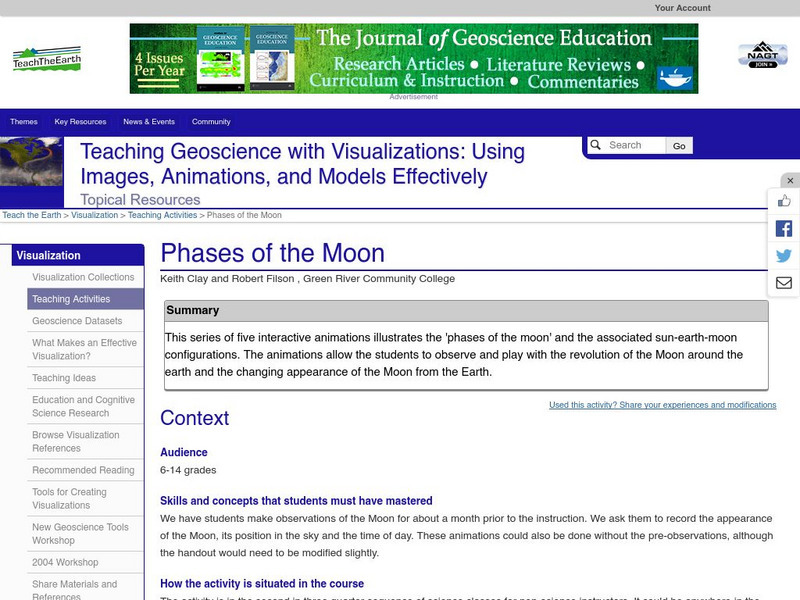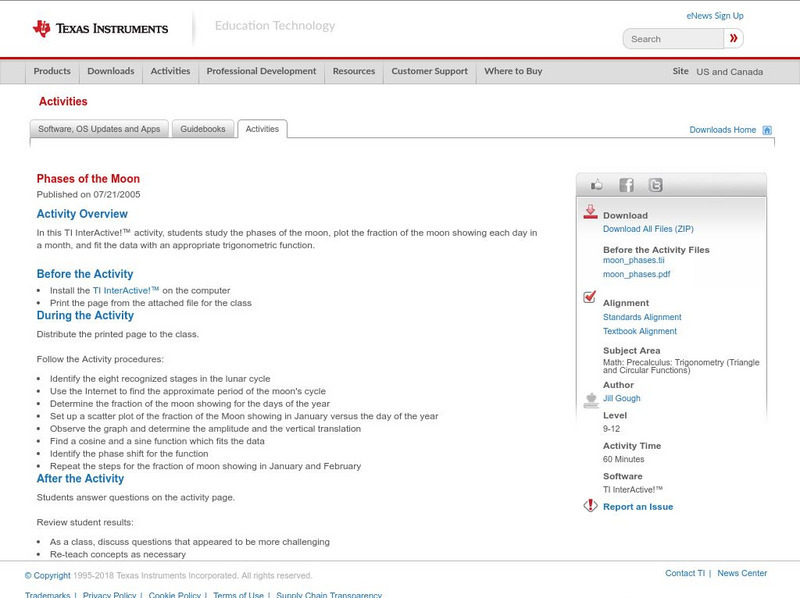Hi, what do you want to do?
Curated OER
English Vocabulary Skills: AWL Sublist 8 - Exercise 5 B
In this online interactive English vocabulary skills worksheet, students answer 10 matching questions which require them to fill in the blanks in 10 sentences. Students may submit their answers to be scored.
Curated OER
Sunrise/Sunset
Students apply data from a weather-related website to predict patterns in the sunrise and sunset.
Curated OER
Our Sky Clock
Students explore space science by completing a worksheet in class. In this astronomy lesson, students discuss and identify star patterns in the night sky and relate these patterns to the approximate time they appear. Students complete an...
Curated OER
Fourth Grade Social Studies
In this social studies worksheet, 4th graders answer multiple choice questions about wars, congress, colonies, and more. Students complete 25 questions.
Curated OER
Charting Seasonal Changes
Students research the Earth's patterns of rotation and revolution, create a chart and graph of these patterns and use them to explain the causes of night and day and summer and winter.
Curated OER
Cultural Calendar
Students design their own cultural calendar. For this calendar making lesson, students decide on a culture for a calendar theme and discuss how calendars differ from the US calendar. Students create their own calendar using a...
Curated OER
Eclipses
In this eclipses worksheet, students read about solar and lunar eclipses to complete 8 short answer questions comparing the two types of eclipses.
Curated OER
Solar and Lunar Eclipses
Students examine eclipses. In this eclipse lesson, students investigate solar and lunar eclipses. Students complete a WebQuest and write a descriptive summary of eclipses. Lesson references a WebQuest, but does not include a link.
Curated OER
Cnidarians
In this cnidarians worksheet, students will read 4 descriptions and identify each as either the polyp or medusa form of cnidarian. Then students will complete 3 short answer questions about the characteristics of cnidarians. Finally,...
Curated OER
Taking Risks: Drug and Alcohol Abuse
Students discuss a video about drug and alcohol abuse and their connection to risk-taking. They answer questions on a risk factor sheet about the use of tobacco, drugs, and alcohol. They discuss long and short term goals and how not...
Curated OER
Collecting Electromagnetic Radiation
Students using different experiments and activities explore electromagnetic radiation and the effect on the Earth.
Curated OER
Celestial Photography
Students practice photographic skills and gain an awareness of photography as a scientific tool.
Curated OER
Pattern Detectives
Students discover patterns in language, math and science. They experience patterns by hearing stories, and becoming pattern detectives.
Curated OER
Galileo Galilei Questions for Study
In this online interactive philosophy worksheet, students respond to 10 short answer and essay questions about Galileo's contributions to science.
PBS
Pbs Learning Media: Phases of the Moon
When we look up at the night sky, why do we see the Moon's appearance changing over time from a full sphere to a crescent to nothing at all? Find the answers in this interactive resource adapted from the National Air and Space Museum.
Cornell University
Cornell University: Astronomy: The Phases of the Moon
This site from Cornell University provides great information on the different phases of the moon. As the Moon moves in its orbit around the Sun, our view of the side illuminated by the Sun changes. Furthermore, the rising and setting...
Science Education Resource Center at Carleton College
Serc: Phases of the Moon
An interactive activity where students observe the different phases of the moon. Activity is part of a lesson plan that includes background information, instructions, and quiz.
ArtsNow
Arts Now Learning: Phases of the Moon [Pdf]
In this lesson, 4th graders use their bodies to model the day/night cycles of the Sun and Earth. Next, they discuss the moon's role in the solar system and explore the eight phases of the moon by acting out a story. Finally, a song...
Michigan Reach Out
Reach Out michigan.org: Phases of the Moon
This site explains the phases of the moon and an easy way to remember waxing and waning. Students have to explain a given phase to their classmates with a model.
CK-12 Foundation
Ck 12: Physics Simulation: Phases of the Moon
[Free Registration/Login Required] Learn how the steady motion of the Moon around the Earth, and the phases created by the relative position of the Earth, Sun, and Moon, allow us to tell time by simply looking at the shape and...
NASA
Nasa Star Child: What Are the Phases of the Moon?
This page provides basic information about the causes of the phases of the Moon. A good diagram shows the lit portion of the Moon as seen from Earth through one complete Lunar cycle.
Alabama Learning Exchange
Alex: Phases of the Moon
This lesson will familiarize young scholars with the phases of the moon. It can be taught in a unit dealing with the solar system. It involves all learning types-kinesthetic, auditory, tactile, and visual.
Texas Instruments
Texas Instruments: Phases of the Moon
In this TI InterActive! activity, students study the phases of the moon, plot the fraction of the moon showing each day in a month, and fit the data with an appropriate trigonometric function.


























